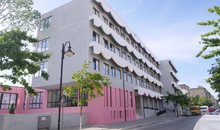
 Flash News
Flash News
After kindergarten children, another case of salmonella food poisoning is discovered in Gramsh
Accident in Germany/ The victims, a 53-year-old man and two women, were returning from a family party
Serious/ Three Albanians dead, four injured in Germany
Mass poisoning in Gramsh's garden, Elbasan Prosecutor's Office launches investigations
Attempted to kill 58-year-old man with axe in Fier, father arrested, son wanted
When Edi Rama criticized Europe for turning a blind eye to Albania
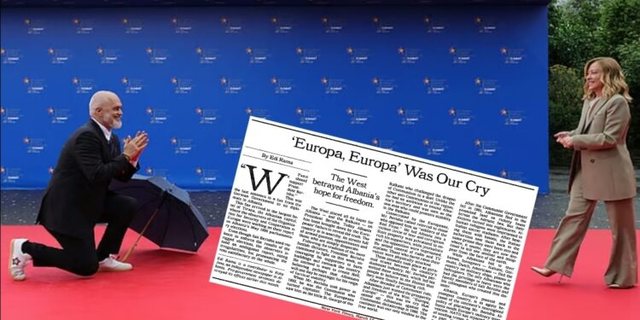
By Fred Abrahams
As the country was crumbling after the collapse of giant pyramid schemes, Rama accused Europe of choosing short-term stability through a strong leader, instead of investing long-term in democracy and the rule of law.
“Today Albania has collapsed because of the failure of Europeans to see the truth,” he wrote (facsimile below).
These words resonate strongly today – except now, Rama is the one in power, having just secured his fourth term as prime minister and last weekend hosted European leaders in Tirana for the sixth summit of the European Political Community (EPC).
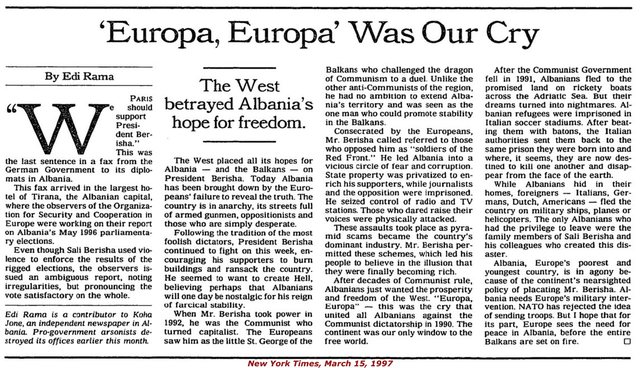
Rama's article in the New York Times, March 15, 1997.
To be clear, the Albania of 2025 is a far cry from the chaos of 1997 under former President Sali Berisha, whose despotism brought Albania to the brink of collapse. But one essential element of that era survives: the concentration of power in a single man – always a man – who dominates the country’s political, social, and economic life.
On the surface, today's Albania appears transformed. Rama, unapologetic and cosmopolitan, pairs sneakers with suits, kneels on red carpets and extends his hand to leaders. But after twelve years in power, his mastery lies in managing foreign relations while maintaining an iron grip on the country.
This control was strengthened on May 11, when Rama and his Socialist Party won convincingly against the Berisha-led opposition, campaigning on a platform of EU membership. The EPC summit then turned into a victory parade.
Every handshake from Meloni, Merz and Macron in Tirana dulled the sharp criticisms of the elections raised by international observers from the OSCE, the Council of Europe and the European Parliament: misuse of public resources, pressure on civil servants and deep control over the media.
Beyond the elections, any international embrace legitimizes the entrenched corruption and oligarchic politics that exist beyond the luxurious towers surrounding Skanderbeg Square in Tirana, where – as the EPC’s official website informs – “Albania’s history and modern identity intertwine.”
The dynamics in Albania retain the same features of the last 35 years: charm abroad, control within. On stage, we see the rule of law, democracy and European values. Behind the scenes, blackmailed judges, bought media and manipulated tenders.
Since the fall of communism, Western governments have shown little interest in democracy in this small Balkan country, even though democratic criteria are part of the requirements for EU membership. What matters most is that Albania behaves responsibly in the region – especially on the issues of Kosovo and North Macedonia, as Rama does. And that it responds to calls when necessary, such as by helping Italy circumvent EU law by sending migrants and asylum seekers to camps in Albania.
Diplomacy abroad, dominance at home.
As Rama warned in 1997, European leaders once again demonstrate a “failure to see the truth.” Or perhaps they see it clearly – and choose not to see it at all.
The author of this Euractiv article, Fred Abrahams, is the author of Modern Albania: from Dictatorship to Democracy. He covered the Southern Balkans for Human Rights Watch from 1993 to 2000.
Latest news


The May 11 defeat, Këlliçi shows what will happen to the DP in the future
2025-05-25 21:26:09

Albanian Railways towards privatization on behalf of the EU
2025-05-25 20:42:34
Cutting down trees for Noizy/Teliti concert: Legal violation
2025-05-25 20:23:16

Serious/ Three Albanians dead, four injured in Germany
2025-05-25 19:49:02
When Edi Rama criticized Europe for turning a blind eye to Albania
2025-05-25 19:37:29

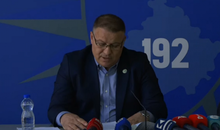

Does he aspire to lead the DP? Here's how Tabaku responds
2025-05-25 18:19:03
Fire in Lazarat, several homes at risk
2025-05-25 18:02:14
Attempted murder of Albanian wanted in Albania, plea bargain granted in Belgium
2025-05-25 17:40:04
Five bodies of skiers found near Swiss resort
2025-05-25 17:27:23
Home loan, shake hands!
2025-05-25 17:09:39
The court leaves "Akili" and 5 others in prison! One is released from the cell
2025-05-25 16:39:14

The rain is leaving, next week starts with clear weather
2025-05-25 15:59:54

How to prevent hormonal changes, the most necessary tips
2025-05-25 15:27:25
The Times Analysis: Will universities survive ChatGPT?
2025-05-25 15:16:08

With drugs and high speed, Albanian loses his life in an accident in Italy
2025-05-25 14:40:36



Israeli strikes kill 20 people in Gaza, including a journalist
2025-05-25 13:02:47

52-year-old dies at work in Tirana, boiler falls on his head
2025-05-25 12:13:07
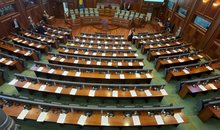
The session to constitute the Kosovo Assembly fails for the 21st time
2025-05-25 11:51:18
New details emerge from the explosion in Berat, two brothers wanted
2025-05-25 11:23:38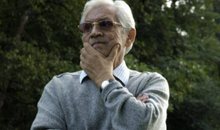
Last tributes to Piro Milkani, the director is being buried in Sharra today
2025-05-25 11:01:54
Foreigners pay more for rent than Germans
2025-05-25 10:41:28
Arlind Kajoshi, suspected of beating Vladimir Bruçi, arrested in Shkodra
2025-05-25 10:32:42
Attempted to kill 58-year-old man with axe in Fier, father arrested, son wanted
2025-05-25 10:05:15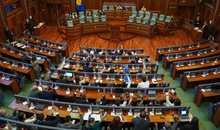

Explosion with explosives in a bar in Berat
2025-05-25 09:42:00
Private railway management
2025-05-25 09:18:32


A car caught fire on the Fier-Lushnje road
2025-05-25 08:41:45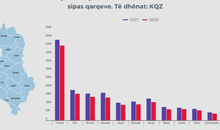
Voters who were absent in the parliamentary elections
2025-05-25 08:37:28
Weather today: Cloudy and temporary rain in some areas
2025-05-25 08:17:25
Morning Post/ In 2 lines: What mattered yesterday in Albania
2025-05-25 08:02:15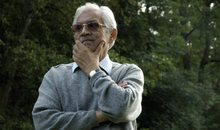
Shuhet në moshën 86-vjeçare regjisori i njohur Piro Milkani
2025-05-24 21:56:38
Kujdes nga mashtrimet online, si teknologjia nxit krimet financiare
2025-05-24 21:32:33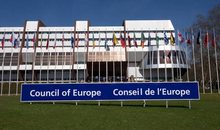

Opposition's denunciations, Xhaferri: We expect the US to listen to us
2025-05-24 20:48:06
How did PSD "capture" over 50% of the votes in rural areas?
2025-05-24 20:29:54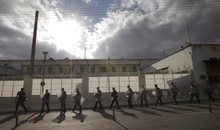
The Albanian woman with the s*x went to meet her husband in Koridalos prison
2025-05-24 20:09:15
Ancelotti says goodbye to Real Madrid in tears: I love you with all my heart!
2025-05-24 19:49:08
Poisoning in Gramsh, parents of children warn of protest
2025-05-24 19:21:36
Taulant Xhaka retires from football
2025-05-24 18:53:35


Incident in the north, Serbia issues arrest warrant for Kosovo police officer
2025-05-24 17:59:24
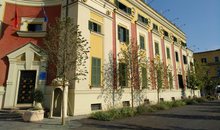
SPAK conducts inspections at Tirana Municipality, 5 phones seized
2025-05-24 17:19:23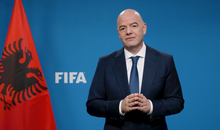
FIFA President congratulates Egnatia on the championship title
2025-05-24 17:00:15


Boçi: The elections were annulled, the DP will continue the fight
2025-05-24 16:06:58
Man reports to police: Wife took my son and ran away, I'm asking for help
2025-05-24 15:45:55
France and Germany with a "non-paper" for Republika Srpska
2025-05-24 15:29:29

Beware of online scams! Here's how technology fuels financial crimes in Albania
2025-05-24 14:53:33

The US military "landed" in Kosovo as part of "Defender Europe 25"
2025-05-24 14:42:19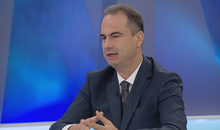
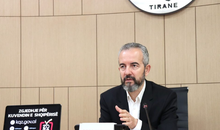







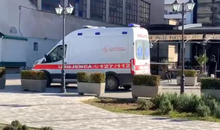
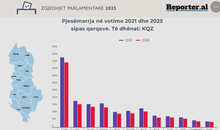
BIRN Analysis: Voters who were absent in the parliamentary elections
2025-05-24 11:19:40


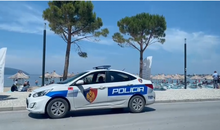
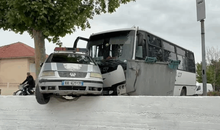
Bus collides with municipal police car in Fier, 6 injured
2025-05-24 09:25:01
Foreign exchange, May 24, 2025
2025-05-24 09:07:27

With rain and storms, get to know the weather forecast
2025-05-24 08:32:03
What do the stars have in store for you today?
2025-05-24 08:17:04
Morning Post/ In 2 lines: What mattered yesterday in Albania
2025-05-24 08:00:34




Tirana Lake Park, a campaign center for Noizy. The signatory is silent
2025-05-23 21:55:02

